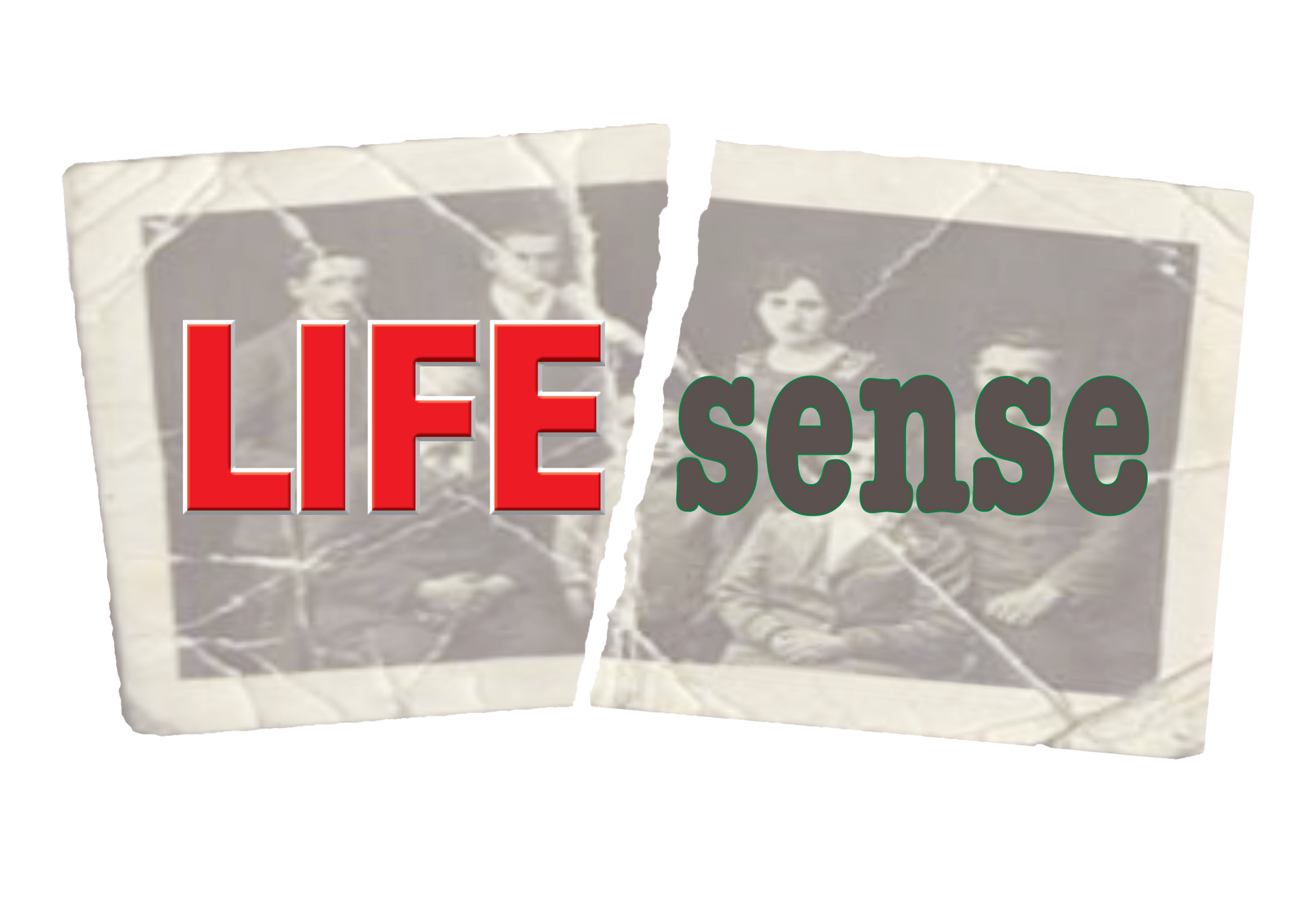
For Reassurance and Stimulation
LIFEsense offers a personalised audiovisual presentation designed to provide stimulation and relief from the distressing symptoms of dementia. It is a bespoke product resulting from in-depth information gathered from the person with dementia, their families, and loved ones. A short film is created featuring family photographs, favorite music, and footage of significant people addressing the person with dementia. Content is selected to allow the person to access long-standing memories, which reinforces a sense of personhood and brings comfort in what can often be a distressing and disorienting illness. The film would ideally be viewed with headphones and could be viewed on a portable player, tablet device, or television.

For Reassurance
and Stimulation
LIFEsense offers a personalised audiovisual presentation designed to provide stimulation and relief from the distressing symptoms of dementia. It is a bespoke product resulting from in-depth information gathered from the person with dementia, their families, and loved ones. A short film is created featuring family photographs, favorite music, and footage of significant people addressing the person with dementia. Content is selected to allow the person to access long-standing memories, which reinforces a sense of personhood and brings comfort in what can often be a distressing and disorienting illness. The film would ideally be viewed with headphones and could be viewed on a portable player, tablet device, or television.

For Reassurance and Stimulation
LIFEsense offers a personalised audiovisual presentation designed to provide stimulation and relief from the distressing symptoms of dementia. It is a bespoke product resulting from in-depth information gathered from the person with dementia, their families, and loved ones. A short film is created featuring family photographs, favorite music, and footage of significant people addressing the person with dementia. Content is selected to allow the person to access long-standing memories, which reinforces a sense of personhood and brings comfort in what can often be a distressing and disorienting illness. The film would ideally be viewed with headphones and could be viewed on a portable player, tablet device, or television.

LIFEsense
About The Owner
My name is Derek Motley and I have been employed for the past 17 years as a Staff Nurse by NHS Greater Glasgow and Clyde. I was born and raised in New Zealand but have lived in Glasgow since 2002. I graduated with a Bachelors in Nursing (Mental Health) from Glasgow Caledonian University and I’m registered with the Nursing and Midwifery Council. I have clinical experience in caring for people with various types of dementia and also have specialist training in psychological approaches to dementia management and I currently work for the NHS Staff Bank providing nursing coverage across the Trust’s mental health in-patient wards. I decided to utilise my experience to develop a personalised, multi-media approach to reduce stress and distress in dementia sufferers. Having identified limitations in the care the NHS is able to offers those with dementia, I offer families and loved ones of those with dementia a powerful therapeutic tool.
LIFEsense
About The Owner
My name is Derek Motley and I have been employed for the past 17 years as a Staff Nurse by NHS Greater Glasgow and Clyde. I was born and raised in New Zealand but have lived in Glasgow since 2002. I graduated with a Bachelors in Nursing (Mental Health) from Glasgow Caledonian University and I’m registered with the Nursing and Midwifery Council. I have clinical experience in caring for people with various types of dementia and also have specialist training in psychological approaches to dementia management and I currently work for the NHS Staff Bank providing nursing coverage across the Trust’s mental health in-patient wards. I decided to utilise my experience to develop a personalised, multi-media approach to reduce stress and distress in dementia sufferers. Having identified limitations in the care the NHS is able to offers those with dementia, I offer families and loved ones of those with dementia a powerful therapeutic tool.
LIFEsense
About The Owner
My name is Derek Motley and I have been employed for the past 17 years as a Staff Nurse by NHS Greater Glasgow and Clyde. I was born and raised in New Zealand but have lived in Glasgow since 2002. I graduated with a Bachelors in Nursing (Mental Health) from Glasgow Caledonian University and I’m registered with the Nursing and Midwifery Council. I have clinical experience in caring for people with various types of dementia and also have specialist training in psychological approaches to dementia management and I currently work for the NHS Staff Bank providing nursing coverage across the Trust’s mental health in-patient wards. I decided to utilise my experience to develop a personalised, multi-media approach to reduce stress and distress in dementia sufferers. Having identified limitations in the care the NHS is able to offers those with dementia, I offer families and loved ones of those with dementia a powerful therapeutic tool.
Services
LIFEsense provides these evidence-based services:
- Support and Advice from a Registered Mental Health Nurse
- Reminiscence Therapy
- Cognitive Stimulation
- Music Therapy
- A Fully Personalised Service
Services
LIFEsense provides these evidence-based services:
- Support and Advice from a Registered Mental Health Nurse
- Reminiscence Therapy
- Cognitive Stimulation
- Music Therapy
- A Fully Personalised Service
Services
LIFEsense provides these evidence-based services:
- Support and Advice from a Registered Mental Health Nurse
- Reminiscence Therapy
- Cognitive Stimulation
- Music Therapy
- A Fully Personalised Service
LIFEsense
Guidelines, References, and Links
I have endeavoured to develop the Lsense multi-media dementia therapy in accordance with best-practice guidelines and current research. It is not unusual that someone with a diagnosis of dementia will present with symptoms of stress and distress. GPs and specialists in old age psychiatry have often resorted to medication-based approaches to manage these symptoms. If the person is responding to hallucinations, they may be prescribed anti-psychotic drugs. If they become aggressive, agitated or anxious, they may be prescribed antidepressants or sedatives.
However, many experts have highlighted the fact that some medications are prescribed with the intention of having a “sedative” or “tranquillising” effect to reduce behaviours that are perceived as difficult. In fact, some of these medications do not have a high success rate in reducing actual distress and come with significant, unwanted side-effects and carry additional risks. These risks may include increased mortality, changes to heart rhythm, drowsiness, movement problems, constipation, risk of stroke, risk of falls and weight gain, to name a few.
To quote professor Sube Banerjee, “The high level of use of antipsychotics (in dementia) means that the potential benefit of their use in specific cases is likely to be outweighed by the adverse effects of their use in general. This overuse of antipsychotic medication is a clear, specific example of the general set of problems in the way our health and social care systems serve people with dementia and their carers. We currently have systems that often work poorly; improving the quality of dementia services for all is the aim of the National Dementia Strategy and the findings of this review are complementary to its implementation.”
Below is a list of academic studies into the effectiveness of the approaches which LIFEsense incorporates followed by useful weblinks.
Andargachew, S. (2009), Simulated Presence Therapy: A psychological approach to challenging behaviour in dementia care, PSIGE Newsletter, No. 114, January 2011, 17-23
Banerjee, S. (2009), The Use of Antipsychotic Medication for People with Dementia: Time for Action. A report for the Minister of State for Care Services, Department of Health.
Bayles, K.A., Kim, E., Chapman, S.B., Zientz, J., Rackley, A., Mahendra, N. et al. (2006), Evidence-based practice recommendations for working with individuals with dementia: Simulated presence therapy, Journal of Medical Speech – Language Pathology, 14(3), 8–21.
Cheston, R., Thorne, K., Whitby, P., & Peak, J. (2007), Simulated presence therapy, attachment and separation amongst people with dementia, Dementia, 6, 442–449.
Cohen-Mansfield, J. (2013), Non-pharmacological Treatment of Behavioural Disorder in Dementia. Current treatment options in neurology, 15:765-785.
McDermott, O. et al (2012), Music therapy in dementia: a narrative synthesis systematic review, International Journal of Geriatric Psychiatry, 2013; 28: 781–794.
O'Connor, C.M., Smith, R., Nott, M.T., Lorang, C., Mathews, R.M., (2009), Using Video Simulated Presence to reduce resistance to care and increase participation of adults with dementia, American Journal of Alzheimer’s Disease & Other Dementias, 26(4) 317-325.
Weinstein, J., Koenig, P., Gunawardena, D; McMillan, C. et al. (2011), Preserved Musical Semantic Memory in Semantic Dementia, Arch Neurol. February, 68(2): 248–250.
Woods, B., Spector, A.E., Jones, C.A.; Orrell, M.; Davies, S.P. (2005), Reminiscence therapy for dementia (Review), The Cochrane Library, Issue 2.
Woods, P., & Ashley, J. (1995), Simulated presence therapy: Using selected memories to manage problem behaviors in Alzheimer’s disease patients. Geriatric Nursing, 16, 9–14.
Zetteler, J., (2008), Effectiveness of simulated presence therapy for individuals with dementia: A systematic review and meta-analysis, Ageing and Mental Health, 12 (6), 779- 785.
LIFEsense
Guidelines, References, and Links
I have endeavoured to develop the Lsense multi-media dementia therapy in accordance with best-practice guidelines and current research. It is not unusual that someone with a diagnosis of dementia will present with symptoms of stress and distress. GPs and specialists in old age psychiatry have often resorted to medication-based approaches to manage these symptoms. If the person is responding to hallucinations, they may be prescribed anti-psychotic drugs. If they become aggressive, agitated or anxious, they may be prescribed antidepressants or sedatives.
However, many experts have highlighted the fact that some medications are prescribed with the intention of having a “sedative” or “tranquillising” effect to reduce behaviours that are perceived as difficult. In fact, some of these medications do not have a high success rate in reducing actual distress and come with significant, unwanted side-effects and carry additional risks. These risks may include increased mortality, changes to heart rhythm, drowsiness, movement problems, constipation, risk of stroke, risk of falls and weight gain, to name a few.
To quote professor Sube Banerjee, “The high level of use of antipsychotics (in dementia) means that the potential benefit of their use in specific cases is likely to be outweighed by the adverse effects of their use in general. This overuse of antipsychotic medication is a clear, specific example of the general set of problems in the way our health and social care systems serve people with dementia and their carers. We currently have systems that often work poorly; improving the quality of dementia services for all is the aim of the National Dementia Strategy and the findings of this review are complementary to its implementation.”
Below is a list of academic studies into the effectiveness of the approaches which LIFEsense incorporates followed by useful weblinks.
Andargachew, S. (2009), Simulated Presence Therapy: A psychological approach to challenging behaviour in dementia care, PSIGE Newsletter, No. 114, January 2011, 17-23
Banerjee, S. (2009), The Use of Antipsychotic Medication for People with Dementia: Time for Action. A report for the Minister of State for Care Services, Department of Health.
Bayles, K.A., Kim, E., Chapman, S.B., Zientz, J., Rackley, A., Mahendra, N. et al. (2006), Evidence-based practice recommendations for working with individuals with dementia: Simulated presence therapy, Journal of Medical Speech – Language Pathology, 14(3), 8–21.
Cheston, R., Thorne, K., Whitby, P., & Peak, J. (2007), Simulated presence therapy, attachment and separation amongst people with dementia, Dementia, 6, 442–449.
Cohen-Mansfield, J. (2013), Non-pharmacological Treatment of Behavioural Disorder in Dementia. Current treatment options in neurology, 15:765-785.
McDermott, O. et al (2012), Music therapy in dementia: a narrative synthesis systematic review, International Journal of Geriatric Psychiatry, 2013; 28: 781–794.
O'Connor, C.M., Smith, R., Nott, M.T., Lorang, C., Mathews, R.M., (2009), Using Video Simulated Presence to reduce resistance to care and increase participation of adults with dementia, American Journal of Alzheimer’s Disease & Other Dementias, 26(4) 317-325.
Weinstein, J., Koenig, P., Gunawardena, D; McMillan, C. et al. (2011), Preserved Musical Semantic Memory in Semantic Dementia, Arch Neurol. February, 68(2): 248–250.
Woods, B., Spector, A.E., Jones, C.A.; Orrell, M.; Davies, S.P. (2005), Reminiscence therapy for dementia (Review), The Cochrane Library, Issue 2.
Woods, P., & Ashley, J. (1995), Simulated presence therapy: Using selected memories to manage problem behaviors in Alzheimer’s disease patients. Geriatric Nursing, 16, 9–14.
Zetteler, J., (2008), Effectiveness of simulated presence therapy for individuals with dementia: A systematic review and meta-analysis, Ageing and Mental Health, 12 (6), 779- 785.
LIFEsense
Digital Resources
Darkness in the Afternoon (2006), Dementia Services Development Centre, The University of Stirling
The Time Machine (2011), MacKenzie & James, Three Motion Media.
Ex Memoria (2006), Appignanesi, J., The Bradford Dementia Group /Missing in Action Films.
LIFEsense
Digital Resources
Darkness in the Afternoon (2006), Dementia Services Development Centre, The University of Stirling
The Time Machine (2011), MacKenzie & James, Three Motion Media.
Ex Memoria (2006), Appignanesi, J., The Bradford Dementia Group /Missing in Action Films.
Alzheimers Scotland:
Action on Dementia
Coping with Dimentia:
A Handbook for Carers (NHS)
Dementia UK:
Life Story Work
Alzheimers Scotland:
Action on Dementia
Coping with Dimentia:
A Handbook for Carers (NHS)
Dementia UK:
Life Story Work
Alzheimers Scotland:
Action on Dementia
Coping with Dimentia:
A Handbook for Carers (NHS)
Dementia UK:
Life Story Work
Dem-Entia CST
CST Web-site
An introduction to Cognitive Stimulation Therapy - CST
Connecting Communities
Dementia Friendly Communities
Dem-Entia CST
CST web-site:
An introduction to Cognitive Stimulation Therapy - CST
Connecting Communities
Dementia Friendly Communities
Dem-Entia CST
CST web-site:
An introduction to Cognitive Stimulation Therapy - CST
Connecting Communities
Dementia Friendly Communities
Have Questions? Let's Talk!
Say Hello
We will get back to you as soon as possible
Please try again later








